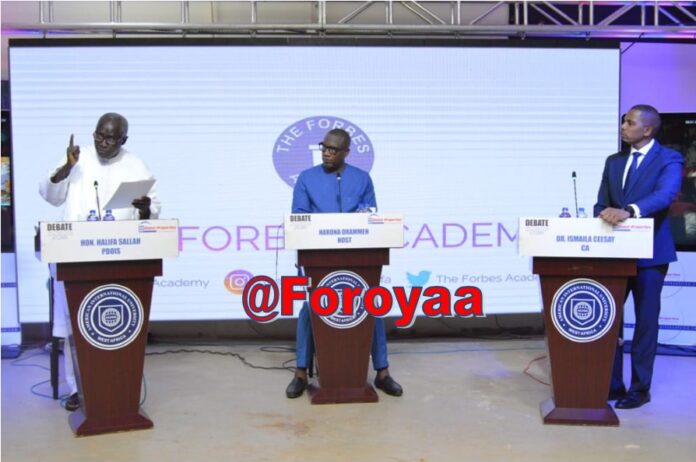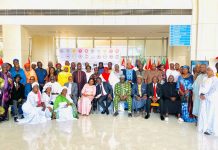By Yankuba Jallow
Dr Ismaila Ceesay, the presidential candidate for the Citizens’ Alliance (CA) last week Wednesday engaged Honourable Halifa Sallah, the Secretary General and presidential candidate for PDOIS in a debate on Coalition 2016.
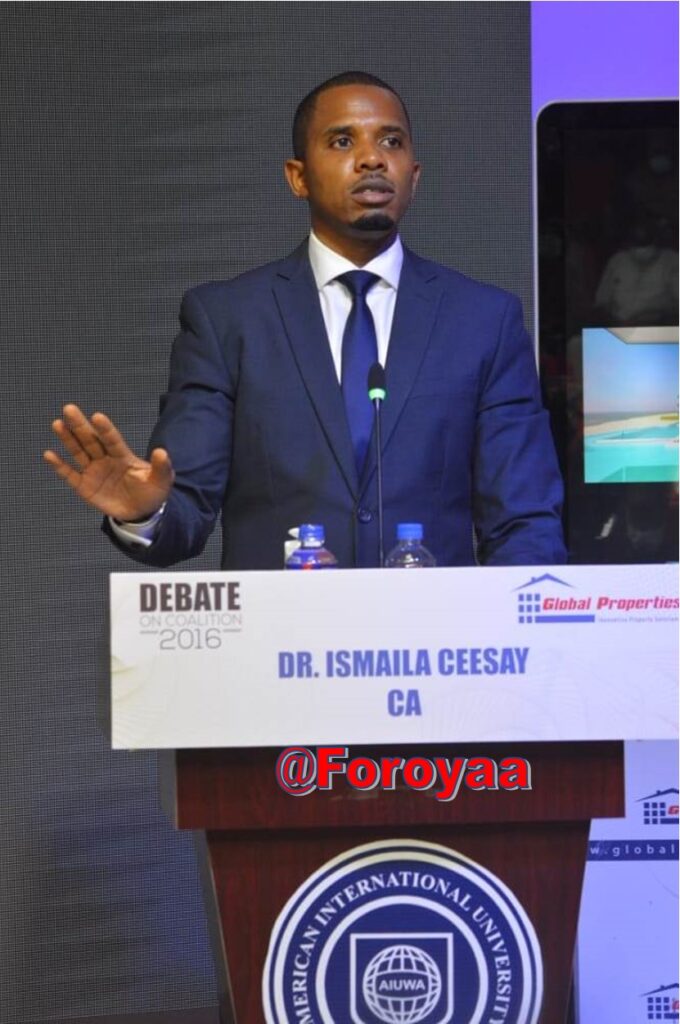
Dr Ceesay accused all coalition members of betraying their agreement and failed to “finish the job”, arguing that they failed to defend the Coalition agreement which resulted in what he referred to as “monumental failures”. He submitted that the Coalition failed to replace the bad system with a better one and all the reforms they promised were either not initiated or failed. According to him, Coalition 2016 only succeeded in removing former President Yahya Jammeh. He however admitted, after he was asked by Sallah, that he has never seen or read the Coalition agreement.
“The agenda as published in the Coalition manifesto and the reforms they promised to do were not successful,” he said.
Dr Ceesay contended that this was a collective failure of the Coalition, saying the Coalition came up with 3 documents; a draft, the 17th October agreement and the Coalition manifesto. He said all these documents were meant to help the Coalition achieve two purposes, which were to change Government through peaceful means and to create enabling environment for elections in a free and fair playing field.
“The agreement was fragile from the beginning,” he said.
Ceesay further said the Coalition members agreed that the person selected as candidate shall serve for 3 years and step down through resignation after which elections would be held in which he or she will not participate. He mentioned that the Coalition members did not anticipate a potential breach of agreement and therefore, could not create clear statutory or other legal mechanisms to ensure that the terms of the agreement were enforceable. He also blamed the Coalition members for not taking President Adama Barrow to court for breach of agreement.
“The agreement was legally binding. It was a written contract, valid and therefore enforceable,” Ceesay said.
CA party leader said when parties sign written contracts, they are expected to fulfil it. He maintained that President Adama Barrow and three other presidential aspirants in the Coalition signed the agreement which makes it binding and enforceable. Ceesay cited a PDOIS press release dated 9th October 2019 which according to him stated “the strategic objective of the Coalition was to put an end to self-perpetuating rule by the voluntary acceptance of the Coalition sponsored candidate to serve a 3-year term and preside over a free and fair elections in he or she will not participate.”
“Why sign an agreement where compliance is voluntary?” he quizzed.
Dr Ceesay argued that the agreement was not a gentleman’s agreement since it was sign and therefore, it is enforceable, adding section 65 of the Constitution provides the basis for resignation of President. He said it was the responsibility of the Coalition members to hold President Barrow to account, but no attempts by the Coalition members were made, either individually or collectively, failed to hold him to account. He said looking at the agenda of the Coalition, one of the goals was to remove Jammeh from power and the other was the aspect of reform. He detailed that the Coalition manifesto made promises to Gambians to bring about reforms in areas like education, governance, economy, human rights and justice.
“Some of the promises made in the agenda that were seen fundamental for the democratisation process were not fully implemented,” Ceesay said.
He explained that the Coalition agenda was to establish a body of jurists and competent personalities to review the Constitution to cleanse provisions that are inimical to democracy and rule of law.
“Instead of that, what we saw was a wholesale change of the Constitution by spending a 116 million dalasis and it didn’t get anywhere,” he said.
Dr Ceesay thanked Halifa Sallah, who raised this in parliament but they did not listen to him. He said the leadership that was provided during the impasse was not matched when it was needed, saying the architect of the Coalition, Sallah, laid back a bit leaving the Coalition void of leadership. The political scientist asked Sallah whether he was offered a cabinet post and if yes, why he opted to go to parliament. He said the Coalition members failed to defend the agreement, adding some of them were undermining what was agreed. In this case, he cited a coalition member who was in Dakar, referring to Mai Fatty, who said he sacked another member, referring to Halifa Sallah, as the spokesperson. Dr Ceesay said another member of the Coalition, referring to Lawyer Ousainou Darboe, stated publicly that President Adama Barrow should go for five years as agreed. Thus, he faulted the coalition members for not defending their agreement when this comment was made.
“The coalition agreement was not defended. There was internal power struggle,” he said.
Ceesay also accused them of betrayal by not standing up to defend the agreement when the President sacked Mai Fatty as the Minister of Interior.
In his counter argument, Sallah said every analysis must take context into consideration, saying one must have a point at issue, interrogate it, gather the evidence in order to pass judgement.
“Unfortunately, maybe the honourable Dr Ceesay can clear that. I don’t think he has ever read the Coalition agreement. His premise will either indicate that he has never read or does not want to fully explain its essence,” Sallah said.
Sallah’s Context
Sallah cited the opposition parties’ proposals and demands for electoral and constitutional reforms in the Gambia dated 7th April 2015 which was sent to former President Yahya Jammeh, ECOWAS and other international organisations. He detailed that the former regime instead of considering the proposals and demands by the opposition parties, decided to pass a law in July the same year increasing the deposit fees for the Office of President (from D10,000 to D500,000), National Assembly (from D5,000 to D50,000 and Local Government (from D2500 to D50,000 for Mayors and Chairpersons and from D1250 to D10,000 for Councillors). Sallah submitted that there was a deliberate attempt to make it impossible for the opposition to survive.
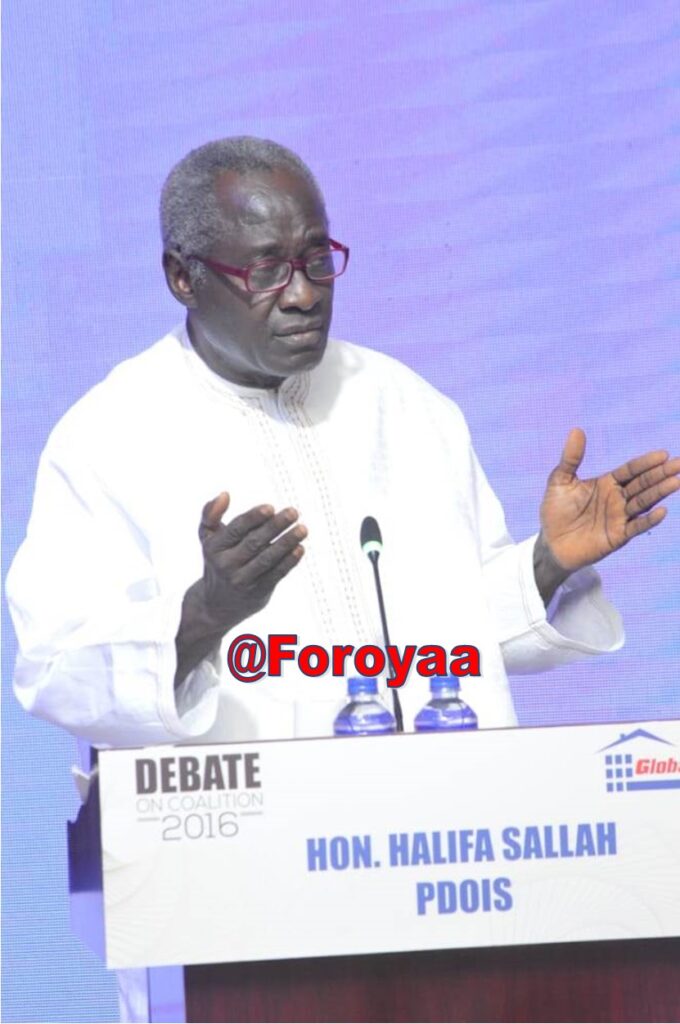
“The response of the Executive was that it will not engage in electoral reform,” he said.
The veteran politician said the 2011 presidential elections indicated very clearly that they cannot remove the President when they stand alone, noting that the opposition parties together had 27% of the total votes cast which equals the total number of votes UDP had in the 2006 presidential elections. He explained that in 2012, the opposition boycotted the National Assembly elections in demand for electoral reform.
“We saw electoral reform to be absolute must,” Sallah said.
Sallah told Dr Ceesay that if he had done proper research, he would have been able to know what PDOIS proposed in its Agenda 2016 which was published in 2015. He said the PDOIS Agenda 2016 provided for the strategic approach to 2016’s presidential elections, adding the agenda strategically analysed that there was a deliberate attempt to frustrate the opposition parties in The Gambia by the government. He said this was why PDOIS was insisting on electoral reform or a coalition in 2016, saying PDOIS took note of the atmosphere that existed at the time because the leader of UDP was in prison, there was an arson attack on the APRC Bureau and Gambians felt that there was no way other than overthrowing the Government.
“The temperature was rising and PDOIS saw the need to implement its strategic objective to try to build a coalition,” Sallah said. Sallah said he was the one who convened a meeting of presidential candidates from the opposition to discuss.
“The beginning was not a coalition of parties. It was a coalition of presidential candidates, who then involved their parties,” Sallah said.
Sallah said he contacted Mr Dembo Bojang to convene a meeting of members of the Opposition Parties for Electoral Reform (GOFA) to engage in coalition building. He stated that the Coalition started the process of being built on the 14th October and on the 17th October 2016, they met to prepare the agreement. The Serrekunda lawmaker said the Coalition had committees on good governance, national convention, democracy and rule of law, justice and human rights and that the committees met and made recommendations which were adopted.
“The 3 years that you [referring to Dr Ceesay] mentioned became part of those recommendations. We participated in the Elections with the view to prevent the deterioration of the peace of the country,” he said.
He emphasised that the purpose of the Coalition was to bring about change and prevent the Gambia from disintegration.
“That was the fundamental objective. The other objectives were collateral objectives to ensure we prevent the Gambia from disintegration,” Sallah said.
Sallah said on the 30th October 2016, the Coalition selected their flagbearer and within a month and two days, they were able to change the country, adding that they campaigned on the message “One Gambia, One People, One Nation.” He said the Coalition succeeded in achieving its fundamental objective because what was perceived impossible became possible after the Coalition succeeded to change the country in 1 month 2 days.
“For the country to change through the ballot box for the first time in 52 years of history, nobody can say the Coalition did not attain the objective for which it was established,” Sallah said.
Next is the context of nation building, the question and answers as well as discussion on CA and PDOIS policies.
Sallah said they defended the constitutional and electoral legitimacy during the impasse, stabilised the country and ensured that there was a peaceful transfer of power.
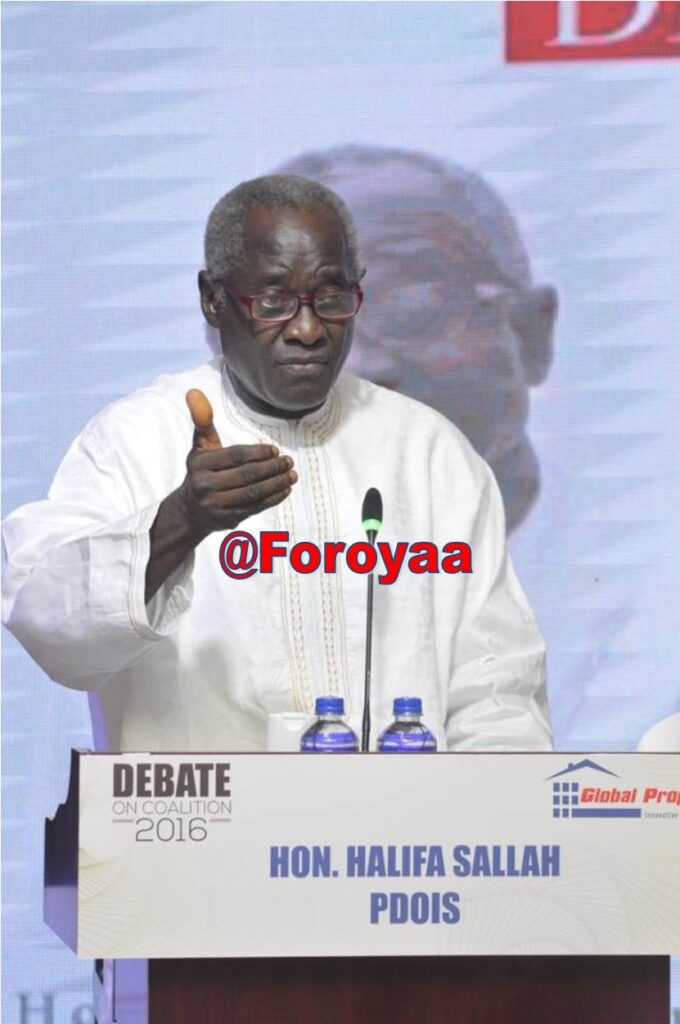
“That is the second attainment of the strategic objectives of the Coalition to ensure transfer of power through peaceful means,” Sallah said.
Sallah mentioned that President Adama Barrow assumed office on the 19th January 2016 while former President Yahya Jammeh left the country on the 21st January 2016.
“The country changed without any looting, without any killing, without any war. No invasion by ECOMIG – they were received as forces of solidarity rather than forces of invasion as we have seen in 1981. Who on earth would say the Coalition failed in that respect? So, all the objectives for which the Coalition was established were actually attained,” he said.
Dr Ismaila’s Ceesay Reaction
Dr Ceesay said he did not read the Coalition agreement and even those who signed the agreement do not have access to it.

“One of the failures of the Coalition is they failed to make enough copies so that each of the signatories have a copy,” he said.
Dr Ceesay said the only copy available online is a draft and the true copy is not available online. He argued that the PDOIS magazine dubbed “Gonga” provides for the specific objectives of the Coalition; that is two phases.
“So, I disagree that it’s [the Coalition’s] goal by initiating peaceful change [of power], but not going further to create an enabling environment for elections in a level playing field,” he said.
Ceesay cited some of the things he mentioned as the failures of the Coalition such as the current President still using the power of incumbency, the lack of a new constitution, and no civil service and security sector reforms. He added that the President uses the same laws like his predecessor.
“How can you call that success? Yes, they have achieved one goal,” Ceesay said.
Ceesay said Sallah failed to counter any of his arguments which suggests that he was in agreement with him at some extent.
Sallah’s Reaction to Dr Ceesay
Sallah reiterated that the Coalition must be examined in context and he was looking at the fundamental objectives. He said the secondary objectives emerged from the recommendations of the committees within the Coalition. He said the meeting was held on the 17th October and on the 30th November 2016, a flagbearer was selected and in 1 month two days, change was attained. He stressed that the Coalition was evolving along the process. He told Dr Ismaila Ceesay that there was nothing like a “draft”.

“Something was prepared for us to consider, but it was never considered,” Sallah said.
Sallah said the recommendations of the Committees were incorporated into the Coalition agreement.
“That should have guided the second process. That second process is Executive Power situated in the Constitution and that Executive Power has absolute authority to appoint and remove ministers whilst the governance established by the Coalition would have required consultation with the Coalition,” Sallah said.
Was Halifa Sallah Offered Cabinet Position?
Dr Ismaila Ceesay asked Sallah twice to clear people’s doubt as to whether he was offered a cabinet post and if yes, why he turned it down and chose to go to the National Assembly. Sallah reminded Dr Ceesay about President Adama Barrow’s statement delivered on the 25th December that the government will establish an Agency for Sustainable Socio-economic Development. He stated that the agency was going to create an Expert Bank and Gambians would send their curriculum vitae, which many did. Sallah said from the Expert Bank they were going to create clusters of Expert Banks on all issues of national development, adding they were to make their short, medium, and long terms recommendations before the President assumed office. He said the ministers that were supposed to be appointed would have relied on those documents for the governance process.
“I volunteered to head that Agency,” Sallah said.
The lawmaker explained that the documents were given to some Coalition members to be vetted and Preston Consulting were hired to prepare the template and to create the database for all Gambians who would wish to be part of that Expert Bank.
“Did that happen?” Sallah quizzed, “all became chaff in the air”.
Sallah said that failure cannot be attributed to the Coalition.
“It was the failure of the Executive assuming office and beginning to run a government like a normal government,” he said.
He stressed that eventually, the government became an Executive Government and not a Coalition Government.
Haruna Drammeh’s Questions
Drammeh told Dr Ismaila Ceesay that a dictatorship ended and the regime built new institutions like the National Human Rights Commission, commissions were set up, the proliferation of political parties and media houses as well as media freedom guaranteed. Would you not attribute all these to success of Coalition 2016?
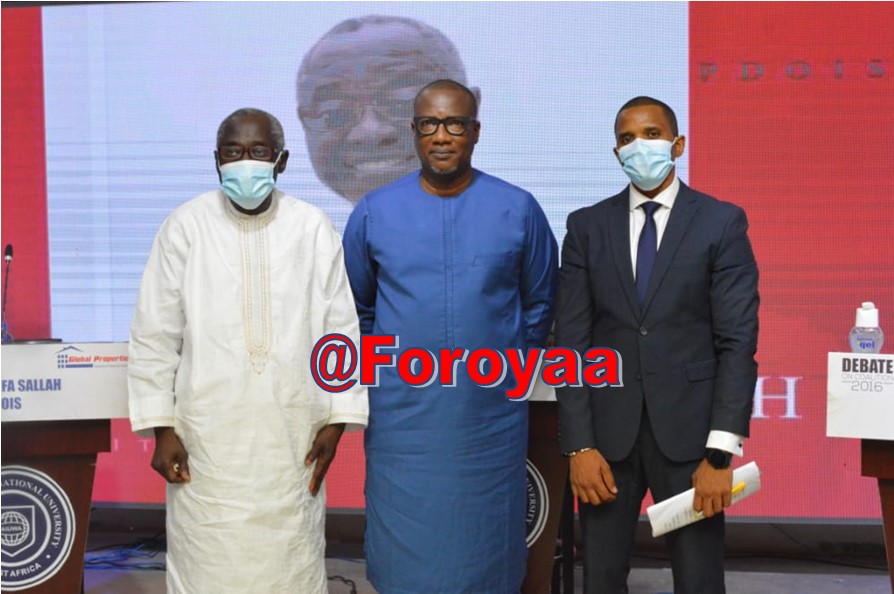
In reply, Dr Ismaila Ceesay said “no to some extent”. He said the TRRC is not ready with its work and if the recommendations of the truth commission are not fully implemented, it would be a failure. Ceesay added that the Janneh Commission recommendations were not fully implemented. He mentioned that there is fiscal indiscipline in the Gambia adding the 28 people the Commission recommended to be dismissed are still working in the system. Ceesay argued that Gambians voted for change and the Coalition cannot take credit for it.
“The Gambians fought for the freedoms. The Coalition cannot take credit for it,” Ceesay said.
Drammeh told Sallah that the people’s view was that, as the architect of the Coalition 2016, he withdrew when he was needed which eventually affected the Coalition and therefore, the work could not be achieved. In response, Sallah said the Coalition was pre-government and post-government, saying the Coalition was existing until when Executive Power was assumed by the President, then it was no more.
“You started to have a normal government. That’s the reality,” he said.
Sallah said the President utilized his executive powers and appointed ministers.
“I will not take account for anything that went wrong after the assumption of Office by the Executive because nobody consulted me on how to run a government after that. That is the point,” Sallah said.
Sallah said PDOIS pushed for Coalition National Assembly candidates, but that did not happen and everyone knows why. He asked Dr Ceesay why he did not stand during for election during the National Assembly elections.
“It was open to every Gambian to stand because the Coalition did not exist anymore. Every Gambian could have participated. Why did’nt you participate?” Sallah asked.
He told Dr Ceesay that it is very easy to indict, but very difficult to assume responsibility.
“I did not run away. I saw what was happening and I knew what I can do. I continued to assist the President to the best of my ability in the decision-making process until it was time to go and contest for a National Assembly seat, then I contested. I knew that in that National Assembly this is where we are going to serve as an oversight – to continue to expose what is wrong and show what is right,” Sallah said.
Sallah said the discretion lies entirely in the Executive to accept what is right and reject what is wrong.
“I have the moral authority to say this Executive needs to be changed. There is need for system change and nobody can question that,” Sallah said.
Drammeh told Dr Ismaila Ceesay that some people are with the view that his party, Citizens’ Alliance, is a product of the 2016 change without which Jammeh would still have been here and there won’t have been Citizens’ Alliance.
Ceesay, in reply, said Jammeh being in power does not inhibit anyone from registering a political party. He cited GMC and GPDP political parties as examples that were registered during the reign of former President Yahya Jammeh. He maintained that even if Jammeh was still in power, after 2016, and they decide to register a party, they would have proceeded to register the Citizens’ Alliance.
“That argument is weak because there was evidence that [political] parties were registering when Jammeh was in power,” Ceesay said.
Sallah in reaction asked Dr Ismaila Ceesay about the whereabouts of the GMC and GPDP leaders at the time of the formation of the Coalition, saying they were both out of the jurisdiction.
“This was not a safe ground for genuine multi-party contest. That is the reality. Let’s accept that fact,” he said and submitted that the Coalition brought the change of government.
Continue: https://foroyaa.net/dr-ismaila-ceesay-halifa-sallah-debate-question-answer-with-the-press/













